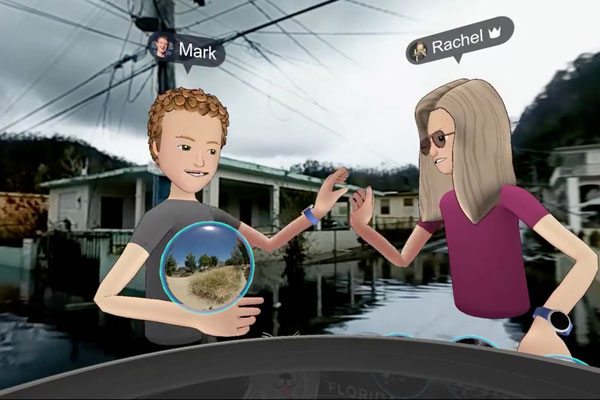
October 11, 2017; Chicago Tribune
The judgement, or lack thereof, exhibited by Mark Zuckerberg in posting a virtual reality stream involving a 3-D version of himself and colleague Rachel Franklin touring a hurricane-ravaged Puerto Rico to promote a new Facebook app gets to one problem that we have with his version of unaccountable billionaire philanthropy. That is, they do not quite seem to connect to the world in which most of us live.
Zuckerberg’s version of philanthropy, as NPQ readers will recall, has the Chan Zuckerberg Initiative operating through an LLC with no transparency other than what he chooses to provide. This is, of course, in return for rejecting tax-exempt status, but it also means that he will be deploying massive amounts of money in the social sphere with little accountability.
The promotion in question showed 3-D cartoons of Zuckerberg and Franklin, from Facebook’s virtual reality team, discussing their “amazing” new app while news footage of a devastated and flooded Puerto Rico rolled in the background.
“You can see that we can really feel like we’re here,” said Franklin.
“This street is really flooded,” added Mark.
Sign up for our free newsletters
Subscribe to NPQ's newsletters to have our top stories delivered directly to your inbox.
By signing up, you agree to our privacy policy and terms of use, and to receive messages from NPQ and our partners.
The 3-D version of Zuckerberg was clearly not very familiar with the disaster, since he did not refer to Hurricane Maria by name and seemed unsure of his topic when he was discussing the storm-ravaged island where much of the infrastructure was destroyed, along with many homes, and where 34 people were killed. On the other hand, he was far more conversant with the app.
“One of the things that’s really magical about virtual reality is you can get the feeling that you’re really in a place,” the cartoon Zuckerberg said while video of flooded houses played in the background. “It feels like we’re really here in Puerto Rico where it’s obviously a tough place to get to now.”
He did promise during the video to have Facebook team with the American Red Cross to create population maps of Puerto Rico to be used by relief organizations, but that does not erase the crassness of advertising an app using the dramatic backdrop of a country in crisis. Among the comments? “Tone deaf,” “incredible and not in a good way,” and “the height of tastelessness.” Maya Kosoff of Vanity Fair called the video a “completely avoidable public relations disaster.”
But one of the perks of being a billionaire is that it is hard to toss them out of the room. Generally, a humble apology will do the trick, even if you do not actually reform your ways. Bill Gates has proven this any number of times in his annual letter, as has Zuckerberg himself when he assumed he knew best about the reform of Newark’s public schools.
So, Zuckerberg has apologized, saying: “One of the most powerful features of VR is empathy. My goal here was to show how VR can raise awareness and help us see what’s happening in different parts of the world.”
We are not completely sure that his argument holds up. This use of virtual reality looks like a bit of thoughtless mockery in contrast to the pieces done by Amnesty international in Syria, for instance. In that instance, the viewer was left with a clear sense of the terrible seriousness of what had happened. With Zuckerberg, the focus is clearly on the app rather than on aiding the suffering of the Puerto Rican people.—Ruth McCambridge












